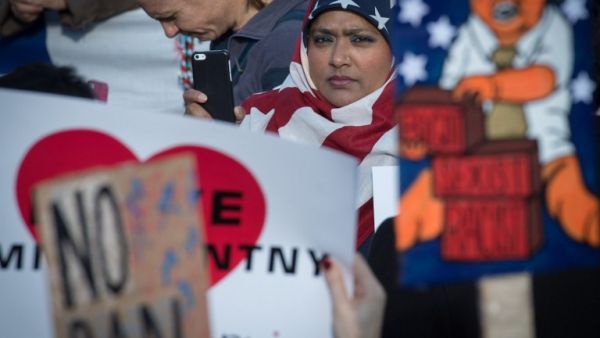US President Donald Trump’s suspension of visas to visitors from seven Muslim-majority countries has caused outrage worldwide. Iran, one of the targeted nations “compromised by terrorism” according to Trump, has already expressed its intention to implement a reciprocal ban on American travellers.
The Iranian foreign minister, Javad Zarif also tweeted the following strongly worded response:
Collective discrimination aids terrorist recruitment by deepening fault-lines exploited by extremist demagogues to swell their ranks. 2/7
— Javad Zarif (@JZarif) 28 January 2017
What, however of the other six states singled out by the new president?
In Iraq, where several thousand US troops are currently stationed in the fight against Daesh, calls for the exclusion of Americans can already be heard.
The foreign affairs committee for the Baghdad parliament on Sunday expressed support for a corresponding “American ban” in response to Trump’s executive order, which has already seen Iraqis refused boarding on flights to the US.
"We clearly demanded that the Iraqi government deal reciprocally in all issues […] with the United States of America," Hassan Shwairid, the committee’s deputy leader, told AFP, stopping short of calling for American troops to be expelled.
Meanwhile, leaders of the Popular Mobilization Front coalition of Shia militias urged that all Americans currently in Iraq be deported.
In the name of of Allah the Merciful, after the US President's decision to ban the entry of Iraqi citizens into the United States of America, we demand:
The prevention of the entry of Americans to Iraq and their removal from all Iraqi territories. We also call on the security authorities and relevant departments to take all measures to ensure Iraq's sovereignty as a state and to preserve the dignity of Iraqis as a people who are fighting terrorism and providing thousands of martyrs on the front line of defense on behalf of the whole world.
Ahmed al-Asadi
Spokesperson for the Popular Mobilization Forces.
Their call was echoed by populist Shia cleric Moqtada al-Sadr, who said in a statement which condemned American “arrogance” that: "You enter Iraq and other countries with all freedom and prevent their entry into your country”.
In Sudan, the American charge d’affaires (most senior diplomat in the absence of an ambassador) has been summoned to meet with government officials over the ban. The foreign ministry in Khartoum has “expressed its displeasure” over the move, which has already affected Sudanese travellers, according to Yahoo news. The ban comes only weeks after Obama's administration suspended sanctions on Sudan for cooperating with anti-terror activities.
"Sudan hopes that the US government will quickly remove Sudan from the list of state sponsors of terrorism and reconsider the decision under Executive Order 13,769 to restrict Sudanese citizens entering the United States,” the ministry said in a statement reported by HuffPost Arabi.
Bashar al-Assad, embattled President of Syria, has not yet issued any response after all Syrians, including refugees, were termporarily barred from Ameria. More than 12,500 people have fled Syria to the United States, since the beginning of his country’s bloody civil war in 2011.
The Yemeni government has also been silent so far, although the official Facebook page for the Yemeni embassy in Washington posted the following warning that any Yemeni nationals in America should not travel until further clarification was given:
Meanwhile, the Libyan and Somali governments are yet to give statements over the move, which has stirred anger across America and abroad.
RA







